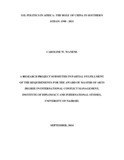| dc.description.abstract | The research examines geo-politics of oil in Africa, with particular focus on the Sino-Sudan
and Sino—Southern Sudan relations. It analyses the role of resource based conflicts in
Africa, with reference to Sudan. The theoretical basis of the thesis is drawn from the Realism
School of Thought, as stipulated in International Relations. Concepts of power, state
centrism, national interests, and international politics [realpolitiks] govern the general tenets
of the Realism School. As a theory, it offers justification of the role of states in international
relations, hegemony, and resource conflicts as evidenced in Southern Sudan, Sudan,
Democratic Republic of Congo, and Nigeria. The study of politics of oil therefore, considers
concepts of foreign policy, energy policy and governance, role of states, natural resources,
power relations, and resource-based conflicts. Subsequently, it looks at the relationship and
implications between politics and natural resources, especially oil in the Sino – Southern
Sudan relations. Although the study focuses on Southern Sudan, it draws from literature on
Sudan and utilizes the word Southern Sudan, given the period under study and the correlation
of history, economics and politics of both north and Southern Sudan. The study, however,
recognizes the independence of South Sudan in 2011. | en_US |

